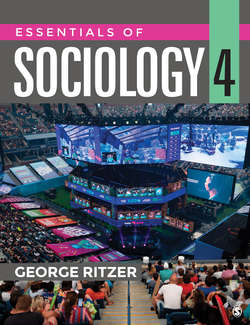Читать книгу Essentials of Sociology - George Ritzer - Страница 60
На сайте Литреса книга снята с продажи.
Postmodern Theory
ОглавлениеPostmodern theory has many elements that fit well under the heading of critical theory, although there is more to it than critique. The term postmodern is used in various ways in relation to social theory. Postmodernity, for instance, is the state of society beyond the “modern era,” which was the era analyzed by the classical social theorists. Among the characteristics of the modern world is rationality, as discussed in Weber’s work. The postmodern world is less rational, nonrational, or even irrational. For example, while in the modern world groups such as the proletariat can plan in a rational manner to overthrow capitalism, in the postmodern world such changes come about accidentally or are simply fated to occur (Baudrillard [1983] 1990; Kellner 2011). Although modernity is characterized by a highly consistent lifestyle, postmodernity is characterized by eclecticism in what we eat, how we dress, and what sorts of music we listen to (Lyotard [1979] 1984). This eclecticism has been fostered by, among others, the internet, which gives people ready access to many more different things (e.g., news, opinion, fashion, music genres) that were not so easily available in the preinternet age.
Postmodern theory is a theoretical orientation that is a reaction against modern theory. It refers to a world that has moved beyond the modern era. Postmodern theorists are opposed to the broad depictions of history and society offered by modern theorists. An example of such a narrative is Weber’s theory of the increasing rationalization of the world and the rise of an “iron cage” constraining our thoughts and activities. Instead, postmodernists often deconstruct, or take apart, modern grand narratives. Postmodernists are also opposed to the scientific pretensions of much modern social theory. They often look at familiar social phenomena in different ways or adopt very different focuses for their work. For example, in his study of the history of prisons, Michel Foucault ([1975] 1979) was critical of the modernist view that criminal justice had grown progressively liberal. He contended that prisons had, in fact, grown increasingly oppressive through the use of techniques such as constant, enhanced surveillance of prisoners. Similarly, he argued against the traditional view that in the Victorian era people were sexually repressed; he found instead an explosion of sexuality in the Victorian era (Foucault 1978).
Jean Baudrillard described the postmodern world as characterized by hyperconsumption, which involves consuming more than we need, more than we really want, and more than we can afford.
Baudrillard also saw the postmodern world as dominated by simulations—that is, inauthentic or fake versions of ”real” things. For example, when we eat at McDonald’s, we consume Chicken McNuggets, or simulated chicken. It is fake in the sense that it is often not meat from one chicken but bits of meat that come from many different chickens. Simulations characterize Disney World (e.g,. Main Street), Las Vegas (the Venetian hotel-casino), and much else in the contemporary world. The idea that we increasingly consume simulations and live a simulated life is a powerful critique of consumer society and, more generally, of the contemporary world. That is, not only are we consuming more, but also much of what we consume is fake.
Ask Yourself
Does a life devoted to hyperconsumption, especially online, cause you to become disconnected from others? Are new kinds of human connections created by a common investment in a life devoted to excessive consumption?
